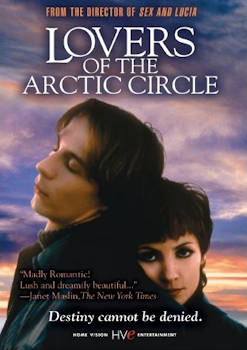LOVERS OF THE ARCTIC CIRCLE
(LOS AMANTES DEL CÍRCULO POLAR)
Released: 1998
Directed By: Julio Medem
Spanish with English subtitles
Cast:
Najwa Nimri: Ana
Fele Martínez: Otto
Kristel Díaz: adolescent Ana
Víctor Oliveira: adolescent Otto
Sara Valiente: young Ana
Peru Medem: young Otto
|

|
Review by John Nesbit, OldSchoolReviews.com
“Lives have many cycles but mine has only turned once and not completely... the most important thing is missing.”
In 2004 Todd Solondz wrote and directed Palindromes to mixed reviews, but for a more satisfying use of palindromes, check out Julio Medem’s Lovers of the Arctic Circle (Los Amantes del Círculo Polar)—a 1998 film finally arriving in U.S. markets through Home Vision Entertainment eight years later. The film’s circuitous route to DVD release oddly seems appropriate to its metaphysical message about how love and fate intertwine across time and space.
A palindrome is a word or phrase that is spelled the same forwards and backwards. This describes the names of the two main characters—Otto and Ana—as well as reflects the theme and structure of the film itself. Everything is connected throughout. Events at the beginning of the film affect what happens at the end, yet the ending may have affected how all the events unfold all along. Aspiring romantic and metaphysical thinkers/lovers/poets all can find satisfaction in Medem’s work.
Otto and Ana are seen at three main periods of their lives—as children, adolescents, and young adults. The film does considerable “time tripping” (akin to Slaughterhouse Five), but ingenious editing and clever transitions flow easily throughout its 112-minute cycle. The children first meet by chance in the woods and become instantly attached to each other. Soon after, Otto sends out paper airplanes with a romantic message that leads to his father and Ana’s mother meeting and falling in love with each other.
Ana becomes Otto’s step-sister, but when adolescent hormones kick in, the two become lovers, and Otto frequently slips into Ana’s bed at night. Miraculously their relationship remains a secret from their parents. They seem destined for each other, but fate intervenes to separate them when Otto’s mother dies. They nearly meet in a Spanish café, but it’s not to be until the star-crossed lovers are both drawn to Finland and the Arctic Circle.
Mere plot details don’t begin to explore the depths that Medem explores here. Using three sets of actors for the various ages, he digs deeply into their characters. Young Otto wonders how he got his name, and its explanation leads to a fascinating WWII anecdote that adds brush strokes to Life’s meaning; it also circuitously ties additional plot threads together that draws both lovers to an ultimately peaceful place. The entire plot hinges upon coincidence, yet demonstrates that things like errantly kicked soccer balls, paper airplane flights, and fender benders with public transport were meant to be.
Primarily we follow the children to understand their characters through various chapters alternating between “Otto” and “Ana” before getting to a later chapter called “Otto/Ana.” The director’s son, Peru Medem, plays Otto as a child while Sara Valiente plays young Ana. While the seamless editing greatly assists the transitions between time periods, credit must also be given to the actors that portray the older versions: the adolescents by Víctor Hugo Oliveira and Kristel Díaz, and the young adults by Fele Martínez and Najwa Nimri.
American audiences expecting a traditional Hollywood ending may be frustrated with the film’s ambiguous finale, but the ending really isn’t all that difficult to understand for anyone following the visual clues. The film opens with a scene showing one of the lovers being reflected in the eye of the other—a puzzle at the beginning that poetically ties together at the end. Medem refuses to dumb down the presentation to craft one of the most beautiful romances in recent memory. Lovers of the Arctic Circle would make a great companion film to Richard Linklater’s recent Before Sunset—a contrast between a highly visual treatment vs. a highly verbal treatment of love and fate. Both are intelligent films that are deeply moving and satisfying explorations into the Zen of love.
